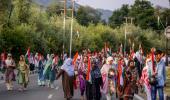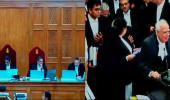Was the decision taken by the Centre on August 5, 2019 to abrogate the provisions of Article 370 of the Constitution, which bestowed a special status on the erstwhile state of Jammu and Kashmir, constitutionally valid? The Supreme Court is scheduled to pronounce its verdict on Monday on a batch of petitions challenging the abrogation of the provisions of Article 370.

According to the cause list for December 11 (Monday), uploaded on the apex court's website, a five-judge Constitution bench headed by Chief Justice D Y Chandrachud would deliver the verdict.
The other members of the bench are Justices Sanjay Kishan Kaul, Sanjiv Khanna, B R Gavai and Surya Kant.
The apex court reserved its verdict in the matter on September 5 after a 16-day hearing.
During the hearing, the top court heard Attorney General R Venkataramani, Solicitor General Tushar Mehta, senior advocates Harish Salve, Rakesh Dwivedi, V Giri and others on behalf of the Centre and the intervenors defending the abrogation of the provisions of Article 370.
Senior advocates, including Kapil Sibal, Gopal Subramanium, Rajeev Dhavan, Zaffar Shah and Dushyant Dave, had argued on behalf of the petitioners.
The lawyers had dwelt on various issues, including the constitutional validity of the Centre's decision to abrogate the provisions of Article 370, the validity of the Jammu and Kashmir Reorganisation Act, which split the erstwhile state into two Union territories, challenges to the imposition of the Governor's rule in Jammu and Kashmir on June 20, 2018 and the imposition of the president's rule on December 19, 2018 and its extension on July 3, 2019.
The petitions challenging the abrogation of the provisions of Article 370 and the validity of the Jammu and Kashmir Reorganisation Act, 2019 that divided the erstwhile state into the Union territories of Jammu and Kashmir and Ladakh were referred to the Constitution bench in 2019.
The arguments in the matter had commenced on August 2.
During the hearing, the apex court had asked who can recommend the revocation of Article 370 in Jammu and Kashmir when no constituent assembly, the concurrence of which is required before taking such a step, exists there.
The top court had also asked how can a provision (Article 370), which was specifically mentioned as temporary in the Constitution, become permanent after the tenure of the Jammu and Kashmir constituent assembly came to an end in 1957.
Some of the petitioners opposing the repeal of Article 370 had argued that the provision could not have been abrogated as the term of the Jammu and Kashmir constituent assembly ended in 1957 after it drafted the erstwhile state's Constitution.
With the constituent Assembly having become extinct, Article 370 acquired a permanent status, they had said.
The Centre had argued that there was no 'constitutional fraud' in annulling the provision that accorded the special status to the erstwhile state of Jammu and Kashmir.
Adequate arrangements made to ensure peace in Kashmir: IGP
Adequate security arrangements have been made to ensure a peaceful atmosphere in Kashmir, a senior police officer said on Sunday.
"We are duty-bound to ensure that peace prevails in the valley under all circumstances," Inspector General of Police (IGP), Kashmir Zone V K Birdi told PTI.
While the IGP refused to divulge specifics of the security set-up for Monday, he said 'adequate arrangements' have been put in place.
"We are taking all precautions and will ensure that peace is not disturbed in Kashmir," Birdi, who held security review meetings in most of the 10 valley districts over the last two weeks, said.
Asked if orders invoking section 144 of the Code of Criminal Procedure (CrPC) on the misuse of social media were related to the Supreme Court's expected judgment, he said there have been several incidents of some elements trying to provoke people.
"There have been several posts recently, in which there were attempts to provoke people. Action has been taken against such elements in the past and action will be taken in the future as well," he added.
The authorities here have issued guidelines for social media users under Code of Criminal Procedure (CrPC) Section 144 to curb the spread of contents that are communally sensitive or promote terrorism and secessionism.
'The guidelines aim to provide clarity on actions citizens should take when encountering content related to terrorism, secessionism, threats, intimidation or communally-sensitive material on social media platforms,' the circular, issued by police in several districts, read.
According to the guidelines, the citizens have been asked to contribute to maintaining a safe online environment and promptly report any suspicious activity.
'If you receive a message containing objectionable content, then report it immediately to the nearest police station or police post with a screenshot and detailed information,' the guidelines read.
The users have been advised to 'recall messages promptly' in case they accidentally share inappropriate content.
Political parties in Kashmir are cautious in voicing their expectations from the Supreme Court.
National Conference (NC) vice-president Omar Abdullah said he can only hope and pray that the decision will be in favour of the people of Jammu and Kashmir.
'Who will say with authority what is to happen? I do not have any such machinery or way by which I can come to know today what those five honourable judges have in their hearts or what they have written in the judgment.
'I can only hope and pray that the decision is in our favour, but neither me nor anyone else can claim that success will be ours. We are waiting for the judgment. Let it come, we will talk about it then,' he said.
People's Democratic Party (PDP) president Mehbooba Mufti said it is the apex court's responsibility to ensure that it does not push the Bharatiya Janata Party's (BJP) agenda, but keeps the integrity of the country and its Constitution intact.
Mufti said the court's decision should be clear that the decision taken by the BJP-led Centre on August 5, 2019 to abrogate the provisions of Article 370 was 'illegal, unconstitutional', against Jammu and Kashmir and the promises made to the people here.
"I think the decision should be simple that whatever was done on August 5, 2019 was illegal, unconstitutional, against Jammu and Kashmir and the promises made to the people here," she said.











 © 2025
© 2025